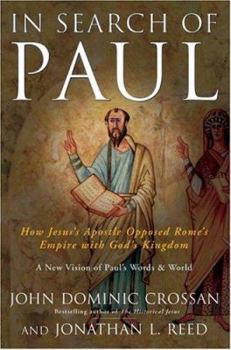In Search of Paul: How Jesus' Apostle Opposed Rome's Empire with God's Kingdom
Select Format
Select Condition 
Book Overview
John Dominic Crossan, the eminent historical Jesus scholar, and Jonathan L. Reed, an expert in biblical archaeology, reveal through archaeology and textual scholarship that Paul, like Jesus, focused... This description may be from another edition of this product.
Format:Hardcover
Language:English
ISBN:0060514574
ISBN13:9780060514570
Release Date:October 2004
Publisher:HarperOne
Length:464 Pages
Weight:1.76 lbs.
Dimensions:1.4" x 6.0" x 9.0"
Customer Reviews
4 ratings
A more historical Jesus
Published by Thriftbooks.com User , 14 years ago
Crossin is an excellent scholar and presents a more historical Jesus than most. It makes the reader want to go back and reread the Gospels.
Most Interesting Book on Paul Yet!
Published by Thriftbooks.com User , 19 years ago
There are alot of books about Paul and I've read my share. This book gave me more information about the world around Paul than about him directly. I feel like I know more about the Roman Empire, the Imperial Cult, the status of Jews and the synagogue in the first century, and the patronage system than I could have learned from a cache of historical books. Crossan and Reed bring it all together for a better understanding about Paul. Crossan let a little of his own beliefs slip into the text. I used to think he was a scholar without "faith." I believe differently now.
A conjecture, but very well written
Published by Thriftbooks.com User , 19 years ago
Any book by Crossan has its own guaranteed readership, to which I admit I belong. This book, however, is a little different. It is really three books in one: The first one is a travelogue through the lands where Christianity and its preceding pagan religions originated. Probably written by co-author Reed, it presents interesting glimpses of archaeological sites in Pompeii and Delos, Corinth and Ephesus, to name a few. It details the construction of pagan temples and Jewish synagogues, of the aqueducts and roads that crisscrossed the land. It is also one of the explanations given regarding the reason for writing "yet another book about Paul." We are told that it helps the reader "be there," that it places Paul in context to his time and environment and hence helps the reader understand him better. Frankly I am not much for travelogues, and I just flipped through the pages whenever I got to them. The second booklet inside the main book, deals with the sociology of the time. The five story apartments where the poor Jews lived in Rome, the villas where the rich people lived, the combination rich house, rental apartments, and shops which would have allowed Paul the craftsman access to rich patrons. The patronage system through which everything got done in those days, moving downwards "from divinity, through royalty, priesthood, aristocracy, and citizens, to the freed, the servile, and the enslaved." This part of the book discusses in detail how Caesar, Augustus, and the other Roman emperors were awarded divinity, and what it meant to the average Roman subject to know that the emperor who governed him was god. And how the Roman government and army had only two purposes: to keep peace and collect taxes. I have to admit that although I was aware that Caesar was apotheosized after his death, I did not appreciate that Augustus and some others were turned into gods while they were still alive, and that the populace believed it. (Try to think of George Bush as a god instead of just a president.) The third part of this book, and probably the main reason why most people buy it, deals with Paul and his ideas. Here we find Crossan's newest conjecture: Paul was a direct antagonist to the Roman Empire, and this was why he had been prosecuted, not because he had threatened the Hebrew or the nascent Christian system of his day. He justifies this by his definition of two Greek words: kyrios, and parousia. Crossan maintains that when Paul referred to Jesus Christ as kyrios he was directly attacking the Roman emperor, because kyrios meant lord, and only the Roman emperor was lord. So the kyrios Jesus Christ, meant the emperor Jesus Christ, a direct confrontation to the Romans. (One can point out, however, that throughout the Gospel of John the word kyrios has been translated variously as lord, master, sir.) Today, in modern Greek kyrios means sir or boss. Crossan also defines the word parousia to mean the visit of the emperor to the provinces
My Year's Best Book
Published by Thriftbooks.com User , 20 years ago
I judge the success of a book by the degree it challenges me, and opens up new perspectives, and this is what Cossan has achieved. I had not realised just how immersed Paul was in his Roman time and culture, how subversive he was to it, and how closely allied he was to Jesus' vision of Jewish justice. I feel that I am 'there' in Roman cultural life, and I feel the immediacy of the man, Paul, on the road, in prison and in the awful death. What the book also does is make me ask many more questions such as why was Paul's vision so quickly muted in the post-Pauline and anti-Pauline developments, how much influence has the classical Roman mind had on Augustine and later Roman Catholic moral attitudes. I want to know more. And, significantly, Crossan and Reed clearly indicate Paul's real positive attitude to women and sex, distinguishing it from the slander often attributed to him. Taken seriously this book is a time bomb for Christian denominations, individual Christians, and for me. But who will heed it? Who did heed the historical Paul? Even Luke in 'Acts' sanitised him. I shall read this book again as there is much to enjoy, much to learn.





